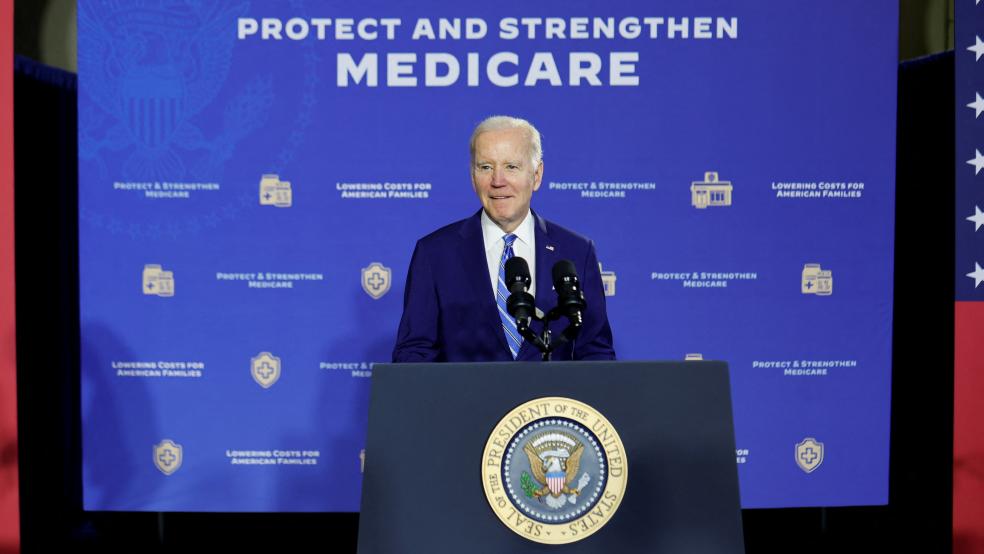President Joe Biden on Tuesday previewed his plan to address a looming Medicare funding crisis, proposing to extend the solvency of a key program trust fund by raising taxes on people making more than $400,000 a year and expanding Medicare’s newly established ability to negotiate drug prices.
In a guest essay for The New York Times and a fact sheet released to the media, Biden and the White House laid out the framework of a plan that they said would extend the life of the Medicare Hospital Insurance trust fund by at least 25 years without cutting benefits.
The trust fund, also known as Medicare Part A, is on pace to be depleted in five years, according to the latest annual report by the program’s trustees. “Roughly 60 million seniors depend on Medicare for their health insurance,” The Washington Post notes. “Because the program is spending money at a much faster clip than it brings in funding, it faces automatic federal cuts starting in 2028, raising the nightmare scenario of medical providers refusing care to senior citizens if Congress and the White House don’t address the looming shortfall first.”
Biden said in his State of the Union address last month and in other remarks since then that his budget plan would extend the trust fund by at least 20 years. The president has sought to contrast his plans for Medicare and Social Security with those proposed by some Republicans, which he insists will threaten those safety net programs.
“For decades, I’ve listened to my Republican friends claim that the only way to be serious about preserving Medicare is to cut benefits, including by making it a voucher program worth less and less every year. Some have threatened our economy unless I agree to benefit cuts,” Biden wrote at the Times. “Only in Washington can people claim that they are saving something by destroying it.”
Biden’s plan: As part of his budget proposal for fiscal year 2024, Biden proposes to raise the Medicare payroll tax rate from 3.8% to 5% on annual income above $400,000 and eliminate a loophole that lets some business owners shield some income from the tax. The plan would also expand the Medicare net investment income tax and dedicate revenue from the tax to the Medicare Hospital Insurance trust fund. And it would expand the prescription drug pricing reforms enacted as part of last year’s Inflation Reduction Act, allowing Medicare to negotiate the prices of more drugs and extending the new rule that drug companies pay rebates to Medicare if they raise prices faster than inflation, applying the requirement to commercial health insurers.
The savings from those expanded reforms, which the White House says would total $200 billion over 10 years, would be credited to the trust fund.
The White House says that not only would the plan maintain Medicare benefits, but it would lower costs for beneficiaries as well. The plan calls for capping out-of-pocket costs for certain generic drugs, such as those used to treat hypertension and high cholesterol, to $2 per prescription per month.
The fiscal hawks at the Committee for a Responsible Federal Budget praised Biden’s effort to address Medicare’s finances. “Anyone who opposes the measures he suggests to lower prescription drug costs and raise new revenue should put forward their own ideas to address Medicare’s rising costs and looming insolvency,” said Maya MacGuineas, the group’s president.
Still, MacGuineas said it would be better to keep the prescription drug savings in Medicare’s Part D drug program and warned that simply redirecting net investment income tax won’t truly improve federal finances. “Absent offsetting measures, this part of their plan simply robs Peter to pay Paul and, in the process, would worsen the budget outlook outside of the trust fund,” she said.
Overall, though, CRFB says the plan would generate hundreds of billions of dollars to strengthen Medicare.
What’s next: Biden’s Medicare plan, like his budget overall, is likely to go nowhere in the House, where the new Republican majority opposes tax increases in general and is certain to oppose Biden’s proposed tax hikes specifically. “Their whole program and their whole vision is more taxes, and more government, and we’re the opposite of that,” Rep. Ralph Norman (R-SC), a member of the conservative House Freedom Caucus, told The Washington Post of Biden’s budget. Kyle Pomerleau, a senior fellow at the conservative American Enterprise Institute think tank, told the Post that Biden’s plan to raise the net investment income tax was less efficient and reliable than simply raising the payroll tax for Medicare.
But the president’s plan will certainly feature prominently in the re-election campaign that Biden is expected to announce soon.
“Republican plans that protect billionaires from a penny more in taxes — but won’t protect a retired firefighter’s hard-earned Medicare benefits — are just detached from the reality that hardworking families live with every day,” Biden wrote in his Times essay. “If the MAGA Republicans get their way, seniors will pay higher out-of-pocket costs on prescription drugs and insulin, the deficit will be bigger, and Medicare will be weaker. The only winner under their plan will be Big Pharma.”
Expect to hear lots more along those lines in the coming months.





